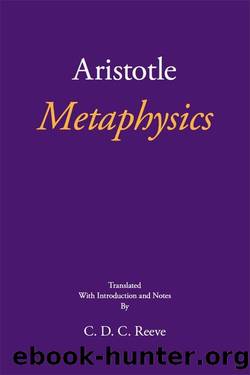Metaphysics (The New Hackett Aristotle) by Aristotle

Author:Aristotle [Aristotle]
Language: eng
Format: epub
ISBN: 9781624665134
Publisher: Hackett Publishing Company, Inc.
Published: 2016-03-01T05:00:00+00:00
BOOK BETA (III)
Note 250
First go over topics about which we should first raise puzzles: See Î 10 993a27n.
Raise puzzles (aporêsai): âThere is a puzzle about whether a thing holds or not, because there are strong arguments on both sidesâ (Top. I 11 104b13â14; also NE IX 8 1168b10â12)âeven if, as the next sentence makes clear, these arguments have been overlooked by other people.
Note 251
Thought (dianoia): Dianoia is often contrasted with the body (Pol. II 9 1270b40, VII 16 1335b16), making âmindâ seem a natural translation of it. But unlike the mind, which includes perception, imagination, belief, knowledge, desire, virtues of character, and other such things, dianoia is contrasted with each of these. It is not perception, because all animals have that, whereas âthe majority of animals do not have dianoiaâ (DA I 5 410b24). It is not imagination, because, as we might put it, dianoia is propositional, or operates on things that can be true or false, asserted or denied (Pol. II 11 1273a22), whereas imagination is a representational state that is more like perception, more âimagistic.â Thus âwhat assertion and denial are in the case of thought, that, in the case of desire, is precisely what pursuit and avoidance areâ (NE VI 2 1139a21â22). Unlike belief and knowledge, however, âthought is in fact not yet assertionâ (VI 9 1142b12â13), making it natural to think of it, or some of it anyway, as the process of reasoning that can culminate in a belief or an asserted proposition (Pol. IV 15 1299a30 and V 8 1307b35 are nice examples). And this is further evidenced by the fact that the virtues of thought, which are theoretical wisdom and practical wisdom (NE I 13 1103a4â6), are (respectively) those of the scientific sub-part and the rationally calculative sub-part, of the part of the soul that has reason (VI 1 1139a5â12). At the same time, the fact that scientific knowledge includes both demonstrative reasoning and a grasp on scientific starting-points by the understanding implies that not all thinking need be in any sense inferential, since understanding is non-inferentialâa grasping of something rather than something process-like (Pol. VII 13 1325b20 is a good example). Dianoia is not desire, because, while desire can cause animal movement without thought, as it does in the case of non-rational animals, âthought by itself⦠moves nothingâ (NE VI 2 1139a35â36). As a result, it is not character (Pol. VIII 2 1337a38â39), since the latter, as involving desire, is cultivated by habituation, {315} whereas dianoia is cultivated by teaching (NE II 1 1103a14â18)âhence the common contrast between thought and character (Pol. III 11 1281b7).
Note 252
Does not even know whether he has found what he was inquiring into: Reading οá½Î´â εἴ ÏοÏε with Ross for OCT οá½Î´á½² Ïá½¹ÏεÏον (ânor does he know whetherâ). See Plato, Men. 80d5â81d5 (quoted Î 9 993a1n).
Note 253
P1: See Î 2 996a18âb26. Restated as P1 at Î 1 1059a20â23. Discussed at Î 1, 2.
The topic we went through the puzzles about (diêporêsamen) in our prefatory remarks: Though the reference could be to Î 2 982b7â10, this is unlikely for the following reason.
Download
This site does not store any files on its server. We only index and link to content provided by other sites. Please contact the content providers to delete copyright contents if any and email us, we'll remove relevant links or contents immediately.
The remains of the day by Kazuo Ishiguro(8999)
Tools of Titans by Timothy Ferriss(8393)
Giovanni's Room by James Baldwin(7346)
The Black Swan by Nassim Nicholas Taleb(7129)
Inner Engineering: A Yogi's Guide to Joy by Sadhguru(6793)
The Way of Zen by Alan W. Watts(6614)
The Power of Now: A Guide to Spiritual Enlightenment by Eckhart Tolle(5781)
Asking the Right Questions: A Guide to Critical Thinking by M. Neil Browne & Stuart M. Keeley(5775)
The Six Wives Of Henry VIII (WOMEN IN HISTORY) by Fraser Antonia(5515)
Astrophysics for People in a Hurry by Neil DeGrasse Tyson(5189)
Housekeeping by Marilynne Robinson(4447)
12 Rules for Life by Jordan B. Peterson(4304)
Ikigai by Héctor García & Francesc Miralles(4274)
Double Down (Diary of a Wimpy Kid Book 11) by Jeff Kinney(4271)
The Ethical Slut by Janet W. Hardy(4251)
Skin in the Game by Nassim Nicholas Taleb(4248)
The Art of Happiness by The Dalai Lama(4130)
Skin in the Game: Hidden Asymmetries in Daily Life by Nassim Nicholas Taleb(4006)
Walking by Henry David Thoreau(3962)
